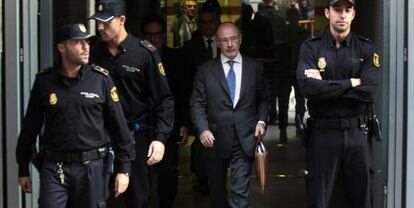Ex-IMF chief filed for 2012 tax amnesty
Rodrigo Rato is allegedly also being investigated for possible money laundering

Rodrigo Rato, a former government official with the Popular Party (PP) who also served as head of the International Monetary Fund (IMF), applied for a 2012 tax amnesty that authorities now believe may have been used by some beneficiaries for money laundering purposes, government sources have told EL PAÍS.
“This is a personal matter and I don’t think I have any obligation to make a statement,” said Rato, who neither denied nor confirmed the revelations.
Rato is already the target of another investigation into his role as chairman of failed savings bank Caja Madrid
According to the online publication Vozpopuli, Rato was one of the 31,000 or so individuals who applied for a tax amnesty offered by the PP administration of Prime Minister Mariano Rajoy in 2012 in a bid to shed light on an estimated €25 billion hidden away in offshore accounts.
But because the offer did not initially produce the desired results, the government lowered the penalty rates and allowed contributions in cash. This last decision is believed to have opened the door to money laundering.
In February of this year, the Tax Agency announced an investigation into 705 taxpayers that it suspects may have used the amnesty to launder money.
Rato was included on this list of 705 suspect cases, which was sent to the Executive Service for Prevention and Capital Laundering (Sepblac).
The opposition wants to know
News that Rodrigo Rato is one of the people who applied for the 2012 tax amnesty triggered immediate political reaction. The PP spokesman in Congress, Rafael Hernando, said it proves “that it this country everyone gets investigated, no matter who they are.”
But the opposition criticized the possibility that Rato may have engaged in money laundering.
Socialist deputy Carmen Montón called it “a scandal” that Rato may have laundered money, considering that he was an economy minister, the chairman of a bank and even the managing director of the IMF.
“It would be simpler if the PP and the government just told us which members of their party applied for the tax amnesty,” she said. “It would go faster, because the list just goes on and on.”
A representative for the leftist group Izquierda Plural, José Luis Centella, said the problem is not so much whether Rato benefited for the amnesty or not, but that such a thing existed at all.
He also said the government should have made public the names of the people who applied for the extraordinary regularization process, as authorities call it.
UpyD leader Rosa Díez noted that her center party has repeatedly asked for these names, and wondered “to what extent the goal of the amnesty was to 'launder' the government’s friends and all their businesses.”
Asked whether he was being investigated by this agency, Rato told EL PAÍS that “I have received no document from any agency stating that I am being investigated by Sepblac.”
Rato, who headed the IMF between 2004 and 2007 and served as deputy prime minister and economy minister in the late 1990s and early 2000s, is already the target of another investigation into his role as chairman of Caja Madrid, the failed savings bank, and its successor Bankia.
An investigating judge is holding Rato and his predecessor, Miguel Blesa, responsible for the credit card abuse that went on at both lenders, where board members and top managers were handed “black cards” with a monthly spending limit that they could use for personal purposes. These cards were not declared to the Tax Agency, nor did the monthly allowances show up as part of the beneficiaries’ salary.
Between 2003 and 2012, 83 executives and board members racked up €15.5 million in expenses that included travel, gourmet restaurants and jewelry.
Finally, Rato is under scrutiny for the way Bankia was floated on the Spanish stock exchange, a move that investigators believe may have involved fraud and document forgery.
According to Vozpopuli, investigators realized that Rato had benefited from the tax regularization when they were looking into a €6 million payment he received from Lazard (where he worked before joining Caja Madrid) into an offshore account in 2011, after Bankia’s flotation.
Tu suscripción se está usando en otro dispositivo
¿Quieres añadir otro usuario a tu suscripción?
Si continúas leyendo en este dispositivo, no se podrá leer en el otro.
FlechaTu suscripción se está usando en otro dispositivo y solo puedes acceder a EL PAÍS desde un dispositivo a la vez.
Si quieres compartir tu cuenta, cambia tu suscripción a la modalidad Premium, así podrás añadir otro usuario. Cada uno accederá con su propia cuenta de email, lo que os permitirá personalizar vuestra experiencia en EL PAÍS.
En el caso de no saber quién está usando tu cuenta, te recomendamos cambiar tu contraseña aquí.
Si decides continuar compartiendo tu cuenta, este mensaje se mostrará en tu dispositivo y en el de la otra persona que está usando tu cuenta de forma indefinida, afectando a tu experiencia de lectura. Puedes consultar aquí los términos y condiciones de la suscripción digital.








































